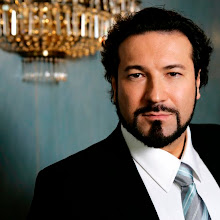Rencontres è una rassegna di canzoni d’arte francesi, da Fauré a Ibert, ed offre una vasta gamma di emozioni e stili compositivi...Il timbro vocale scuro, la straordinaria cultura canora e una notevole facilità di coloratura di Carlo Colombara ne fanno uno dei più apprezzati cantanti nel registro di basso. I critici di tutto il mondo non mancano di esaltarne la poliedricità stilistica e le grandi doti interpretative, grazie alle quali Colombara può passare dalla prepotente autorevolezza dei padri e dei monarchi verdiani alle filigrane del belcanto italiano. (© Dynamic)

Track List
01 Automne op. 18 n. 3 (Gabriel Fauré)
02 Rencontre (Poème d’un jour op. 112 - Gabriel Fauré)
03 Toujours (Poème d’un jour op. 112 - Gabriel Fauré)
04 Adieu (Poème d’un jour op. 112 - Gabriel Fauré)
05 Chanson du pêcheur op. 4 n.1 (Gabriel Fauré)
06 Les berceaux op. 23 n.1 (Gabriel Fauré)
07 L’heure exquise (Reynaldo Hahn)
08 L’absent (Chansons grises - Charles Gounod)
09 L’invitation au voyage (Henri Duparc)
10 Le manoir de Rosamonde (Henri Duparc)
11 La vie antérieure (Henri Duparc)
12 Phidylé (Henri Duparc)
13 Voyage (Francis Poulenc)
14 La grenouillière op. 5 (Francis Poulenc)
15 Chanson du départ de D. Quichotte (Chansons de Don Quichotte - Jacques Ibert)
16 Chanson à Dulcinée (Chansons de Don Quichotte - Jacques Ibert)
17 Chanson du Duc (Chansons de Don Quichotte - Jacques Ibert)
18 Chanson de la mort de D. Quichotte (Chansons de Don Quichotte - Jacques Ibert)
19 Chanson romanesque (Don Quichotte à Dulcinée - Maurice Ravel)
20 Chanson épique (Don Quichotte à Dulcinée - Maurice Ravel)
21 Chanson à boire (Don Quichotte à Dulcinée - Maurice Ravel)
Artists
Carlo Colombara (bass)
Rani Calderon (piano)
Label: Dynamic
Price: 15, 60 €
You can buy it
hereREVIEWS
“La bella voce di Colombara, morbida e pastosa grazie alla buona tecnica d’emissione posta a governarla, è ideale: Colombara ricorda [Gérard Souzay] nella calda comunicativa dell’accento e nella malinconica dolcezza sensuale con cui inflette l’aristocratica linea melodica di brani tra i più belli dell’intera letteratura musicale europea”.
Classic Voice“Colombara coglie le parole chiave, la tinta di ciascuna mélodie conferendo quindi la lettura più appropriata. Addirittura splendida l’interpretazione disincantata, quasi blasée, de “L’heure exquise” di Reynaldo Hahn, mentre la resa dei quattro brani di Duparc,è caratterizzata da belle idee interpretative".
Nicola Cattò,
Musica“Un Colombara notevolmente ispirato e in grande forma vocale. Un CD non banale, senza dubbio utile, tecnicamente ben realizzato, ottimamente cantato e altrettanto magistralmente suonato, che si ascolta con grande piacere… più e più volte”.
Danilo Boaretto, Operaclick
“En esta selección de bien conocidas canciones muestra la homogeneidad de sus registros y la identificación con el personaje, aportando un tono varonil que casa perfectamente con lo demandado por los compositores. Es de agradecer que una voz de bajo, tan poco abundantes en el circuito del recital de lied dominado por barítonos, tenores y voces femeninas, de tan buen dominio técnico y expresivo nos regale este disco”.
Ritmo“Colombara sortea el desafío con previsible suntuosidad sonora y muestra el dominio sobre la lengua y la variedad estilística que el menú escogido demanda. Es introspectivo en Fauré, recorre con individualidad las páginas de Duparc, desfallece en voluptuoso decadentismo con Hahn, despliega su lirismo en Gounod, cambia de registro retórico con Poulenc y llega, por fin, a las obras de Ibert y Ravel que exigen un personaie: Don Quiiote. Este encuentro con el baio peninsular será para casi todos una sorpresa mis que agradable y, en el panorama de la canción de cámara, un jalón personal que, seguramente, animará a otros solistas de su tesitura a imitar la excelencia del trabajo cumplido”.
Blas Matamoro,
Diverdi“Carlo Colombara ha ido consolidando su fama en España gracias a su gran vocación operística. El teatro le encanta, y así lo demuestra este bajo que no renuncia a la tradición interpretativa pero que va más allá en sus actuaciones buscando un sonido atractivo y envolvente. Un fraseo conmovedor, suficiente registro grave y una buena dosis de ex - presividad caracterizan este disco que sin duda contentará a los amantes del género y a los seguidores de este bajo enamorado de España”.
Laura Byron, Ópera Actual
“Bolognese bass Carlo Colombara brings much of the right technical and vocal equipment to this French recital. His resonant, medium-weight basso cantante is anchored in a solid legato. His command of register balances allows him a dynamic give-and-take that colors the music and text expressively, especially in the Fauré selections. His firm rhythmic address keeps the phrases moving with purpose. And his handling of the French is mostly conscientious. He doesn't Italianize the language, and nearly everything is intelligible. There are lovely things in nearly every number ".
Stephen Francis Vasta,
Opera News“Many of these [songs] are filled with exquisite fragrances that can only be caught in the singers’ equivalent of water-colour painting. He sings softly, nuanced and with fine attention to the texts – delivered in good French. Hahn’s L’heure exquise is finely shaded, the two Poulenc songs intimate and atmospheric. Throughout the programme he shows deep commitment and an understanding of the texts”.
Göran Forsling,
Music Web
 Tracklist
Tracklist











.jpg)